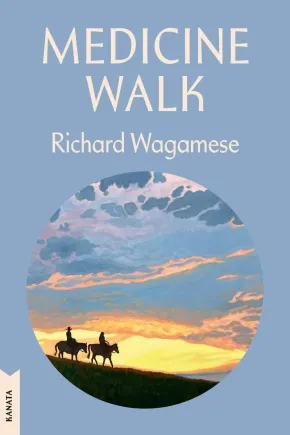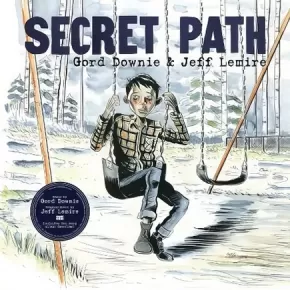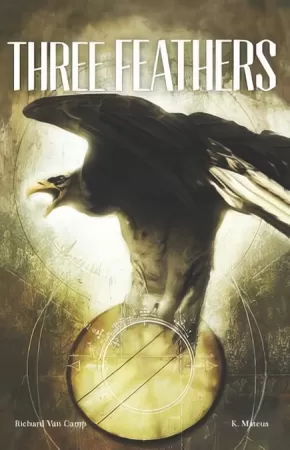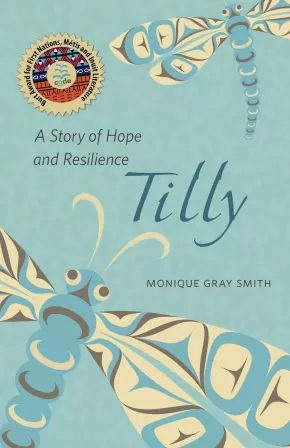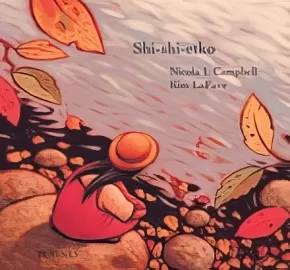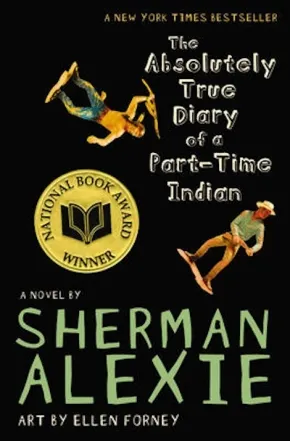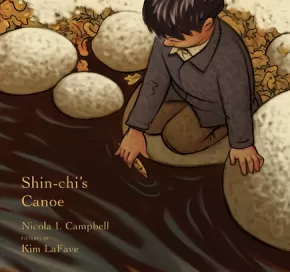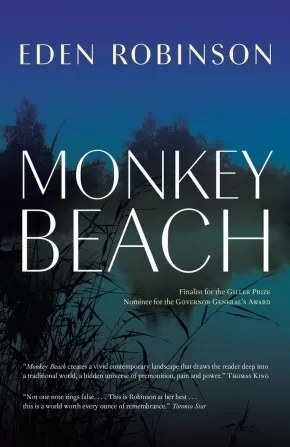Grade 10: Childhood through the Eyes of Indigenous Writers
Resources for Grade 10: Childhood through the Eyes of Indigenous Writers.
Synopsis:
By the celebrated author of Canada Reads Finalist Indian Horse, a stunning new novel that has all the timeless qualities of a classic, as it tells the universal story of a father/son struggle in a fresh, utterly memorable way, set in dramatic landscape of the BC Interior. For male and female readers equally, for readers of Cormac McCarthy, Thomas King, Russell Banks, and general literary.
Franklin Starlight is called to visit his father, Eldon. He's sixteen years old and has had the most fleeting of relationships with the man. The rare moments they've shared haunt and trouble Frank, but he answers the call, a son's duty to a father. He finds Eldon decimated after years of drinking, dying of liver failure in a small town flophouse. Eldon asks his son to take him into the mountains, so he may be buried in the traditional Ojibway manner.
What ensues is a journey through the rugged and beautiful backcountry, and a journey into the past, as the two men push forward to Eldon's end. From a poverty-stricken childhood, to the Korean War, and later the derelict houses of mill towns, Eldon relates both the desolate moments of his life and a time of redemption and love and in doing so offers Frank a history he has never known, the father he has never had, and a connection to himself he never expected.
A novel about love, friendship, courage, and the idea that the land has within it powers of healing, Medicine Walk reveals the ultimate goodness of its characters and offers a deeply moving and redemptive conclusion.
Wagamese's writing soars and his insight and compassion are matched by his gift of communicating these to the reader.
Reviews
“In Medicine Walk, Wagamese manages the nuances of betrayal and redemption with uncommon artistry. It is a breathtaking novel of sorrow, hope and polished steel.” – Thomas King
“A deeply felt and profoundly moving novel, written in the kind of sure, clear prose that brings to mind the work of the great North American masters; Steinbeck among them. But Wagamese's voice and vision are also completely his own, as is the important and powerful story he has to tell.” – Jane Urquhart
“Medicine Walk recounts the mythic journey of an estranged father and son who are searching for reconciliation and love. Richard Wagamese’s novel renders the Canadian wilderness with staggering insight and beauty. The same can be said for his understanding of the fragility, wildness and resilience of the human heart. Magnificent.” – Lisa Moore
“Medicine Walk is a masterpiece, a work of art that explores human interconnectedness with a level of artistry so superb that the personal becomes eternal.” – National Post
“A moving story…. Wagamese balances the novel’s spiritual and political subtexts with sly humour, sharp, believable dialogue and superb storytelling skills. Medicine Walk is a major accomplishment from an author who has become one of Canada’s best novelists.” – Toronto Star
“This is very much a novel about the role of stories in our lives, those we tell ourselves about ourselves and those we agree to live by…. Wagamese understands that the stories we don’t tell are as important as the ones we do….But Medicine Walk is also testament to the redemptive power of love and compassion.” – Globe and Mail
“One of the finest novels of the year…. Medicine Walk is not only a graceful book, it is a novel of grace, of coming to terms with hidden truths, of coming to know the secrets behind forbidding appearances, of finding the humanity within strangers.” – Vancouver Sun
“An essential read…. Superbly written.” – Now Magazine (NNNN)
Educator & Series Information
This edition of Medicine Walk is part of the Kanata Classics series, which celebrates timeless books that reflect the rich and diverse range of voices in Canadian literature.
Grades 10-12 BC English First Peoples resource for units on Childhood, Place-Conscious Learning, and Family.
Additional Information
256 pages | 5.50" x 8.25" | Paperback
Synopsis:
Secret Path is a ten song album by Gord Downie with a graphic novel by illustrator Jeff Lemire that tells the story of Chanie “Charlie” Wenjack, a twelve-year-old boy who died in flight from the Cecilia Jeffrey Indian Residential School fifty years ago.
Chanie, misnamed Charlie by his teachers, was a young boy who died on October 22, 1966, walking the railroad tracks, trying to escape from the Cecilia Jeffrey Indian Residential School to return home. Chanie’s home was 400 miles away. He didn’t know that. He didn’t know where it was, nor how to find it, but, like so many kids—more than anyone will be able to imagine—he tried.
Chanie’s story is Canada’s story. We are not the country we thought we were. History will be re-written. We are all accountable. Secret Path acknowledges a dark part of Canada’s history—the long-suppressed mistreatment of Indigenous children and families by the residential school system—with the hope of starting our country on a road to reconciliation. Every year as we remember Chanie Wenjack, the hope for Secret Path is that it educates all Canadians young and old on this omitted part of our history, urging our entire nation to play an active role in the preservation of Indigenous lives and culture in Canada.
The next hundred years are going to be painful as we come to know Chanie Wenjack and thousands like him—as we find out about ourselves, about all of us—but only when we do can we truly call ourselves, “Canada.”
Proceeds from Secret Path will be donated to The Gord Downie Secret Path Fund for Truth and Reconciliation via The National Centre for Truth and Reconciliation (NCTR) at The University of Manitoba.
Educator Information
Recommended resource for English First Peoples grades 10-11 for units on Childhood through the Eyes of Indigenous Writers and First Steps - Exploring Residential School and Reconciliation through Children's Literature.
Note: This resource is not considered an authentic First Peoples resource.
Additional Information
96 pages | 12.00" x 12.00"
Synopsis:
Three young men—Flinch, Bryce, and Rupert—have vandalized their community and are sent by its Elders to live nine months on the land as part of the circle sentencing process. There, the young men learn to take responsibility for their actions and acquire the humility required to return home. But, when they do return, will they be forgiven for what they’ve done?
Three Feathers explores the power and grace of restorative justice in one Northern community and the cultural legacy that can empower future generations.
Three Feathers is the third title in The Debwe Series. Created in the spirit of the Anishinaabe concept debwe (to speak the truth), The Debwe Series is a collection of exceptional Aboriginal writings from across Canada.
Reviews
"Three Feathers is a graphic novel illustrated by stark, black and white images. Many of the frames have no captioning, inviting the reader to intuit the narrative. K. Mateus, the illustrator, makes imaginative use of Aboriginal symbols and motifs in this 48 page book; when Gabe is attacked, demonic figures shadow the background, and when Bryce rails at the members of the community sentencing circle, the image of an angry wildcat snarls behind him." - CM Magazine
Educator & Series Information
Grades 10-12 BC English First Peoples Resource for units on Childhood and Place-Conscious Learning.
Recommended for grades 9 to 12.
This book is part of The Debwe Series, which features exceptional Indigenous writings from across Canada.
This book is available in French: Trois Plumes
Additional Information
48 pages | 6.50" x 10.00"
Synopsis:
Tilly has always known she’s part Lakota on her dad’s side. She’s grown up with the traditional teachings of her grandma, relishing the life lessons of her beloved mentor. But it isn’t until an angry man shouts something on the street that Tilly realizes her mom is Aboriginal, too—a Cree woman taken from her own parents as a baby.
Tilly feels her mother’s pain deeply. She’s always had trouble fitting in at school, and when her grandma dies unexpectedly, her anchor is gone. Then Abby, a grade seven classmate, invites her home for lunch and offers her “something special” to drink. Nothing has prepared Tilly for the tingling in her legs, the buzz in her head and the awesome feeling that she can do anything. From then on, partying seems to offer an escape from her insecurities. But after one dangerously drunken evening, Tilly knows she has to change. Summoning her courage, she begins the long journey to finding pride in herself and her heritage. Just when she needs it most, a mysterious stranger offers some wise counsel: “Never question who you are or who your people are. It’s in your eyes. I know it’s in your heart.”
Loosely based on author Monique Gray Smith’s own life, this revealing, important work of creative non-fiction tells the story of a young Indigenous woman coming of age in Canada in the 1980s. With compassion, insight and humour, Gray Smith illuminates the 20th-century history of Canada’s First Peoples—forced displacement, residential schools, tuberculosis hospitals, the Sixties Scoop. In a spirit of hope, this unique story captures the irrepressible resilience of Tilly, and of Indigenous peoples everywhere.
Awards
- 2014 Burt Award Winner
Reviews
“What a gorgeous read! Reminiscent of Lee Maracle’s Will’s Garden and Ruby Slipperjack’s Little Voice, Tilly will bring strength, comfort and peace to all who read it. Let it discover and inspire you, too. Wow! I've been waiting for a book like this for years. Mahsi cho, Monique Gray Smith, for digging so deep to create something so loving and nurturing for the world.” —Richard Van Camp, author of The Lesser Blessed and The Moon of Letting Go
"Gray Smith intricately pieces together stories, traditional teachings and hard-earned personal wisdom, creating a hand-stitched quilt you can’t help but wrap yourself in—a quilt filled with optimism and the assurance that no matter how lost we are, hope, love and guidance surround us at every turn. Delicate with the handling of mature details, but fiercely candid with emotion, Tilly is an ideal resource not only for youth, but also for those who are easily triggered, while its universality will be appreciated by a wider audience. A brave new voice ready to take her place among the great contemporary storytellers, Gray Smith breaks her own trails as she explores what it means to be Indigenous in a modern world." —Christy Jordan-Fenton, author of Fatty Legs, A Stranger at Home and When I Was Eight
Educator Information
Recommended Ages: 15-18.
Grades 10-12 English First Peoples resource for units on Childhood through the Eyes of Indigenous Writers and Exploring Text through Local Landscape.
Additional Information
208 pages | Ages 14+
Synopsis:
In just four days young Shi-shi-etko will have to leave her family and all that she knows to attend residential school.
She spends her last days at home treasuring the beauty of her world -- the dancing sunlight, the tall grass, each shiny rock, the tadpoles in the creek, her grandfather's paddle song. Her mother, father and grandmother, each in turn, share valuable teachings that they want her to remember. And so Shi-shi-etko carefully gathers her memories for safekeeping.
Richly hued illustrations complement this gently moving and poetic account of a child who finds solace all around her, even though she is on the verge of great loss -- a loss that native people have endured for generations because of the residential schools system.
This gentle story of a child on the verge of great loss was selected as the Aboriginal Children’s Book of the Year.
Awards
- Winner of the Anskohk Aboriginal Children's Book of the Year Award.
Educator Information
Recommended Grades: 1-10.
Curriculum Connections: Indigenous Studies, Visual Arts, Science, Health.
Recommended Authentic First Peoples resource K-9.
This illustrated children's story is recommended for English First Peoples Grades 10 for units pertaining to childhood through Indigenous writers' eyes and the exploration of residential schools and reconciliation through children's literature.
This book is available in French: Shi-shi-etko (French)
Additional Information
32 pages | 8.50" x 8.13"
Synopsis:
In his first book for young adults, bestselling author Sherman Alexie tells the story of Junior, a budding cartoonist growing up on the Spokane Indian Reservation. Determined to take his future into his own hands, Junior leaves his troubled school on the rez to attend an all-white farm town high school where the only other Indian is the school mascot.
Heartbreaking, funny, and beautifully written, The Absolutely True Diary of a Part-Time Indian, which is based on the author's own experiences, coupled with poignant drawings by Ellen Forney that reflect the character's art, chronicles the contemporary adolescence of one Native American boy as he attempts to break away from the life he was destined to live.
Educator Information
Recommended Grades: 7-12.
Resource for English First Peoples 10-12.
Caution: This text has some mature language.
Additional Information
288 pages | 5.50" x 8.25"
Synopsis:
Irreverently funny and brutally honest Governor General's Award-winning play about loss and redemption. Cast of 2 women and 4 men.
Grades 10-12 English First Peoples resource for the units Childhood through the Eyes of Indigenous Writers and Further Steps toward Reconciliation.
96 pages | 5.50" x 8.50"
Synopsis:
This moving sequel to the award-winning Shi-shi-etko tells the story of two children's experience at residential school. Shi-shi-etko is about to return for her second year, but this time her six-year-old brother, Shin-chi, is going, too. As they begin their journey in the back of a cattle truck, Shi-shi-etko takes it upon herself to tell her little brother all the things he must remember: the trees, the mountains, the rivers and the tug of the salmon when he and his dad pull in the fishing nets. Shin-chi knows he won't see his family again until the sockeye salmon return in the summertime.
When they arrive at school, Shi-shi-etko gives him a tiny cedar canoe, a gift from their father. The children's time is filled with going to mass, school for half the day, and work the other half. The girls cook, clean and sew, while the boys work in the fields, in the woodshop and at the forge. Shin-chi is forever hungry and lonely, but, finally, the salmon swim up the river and the children return home for a joyful family reunion.
Awards
- 2009 TD Canadian Children’s Literature Award
- 2008 Governor General’s Literary Award for illustration
Reviews
"Shin-Chi’s Canoe is a story about a brother and sister sent to a residential school and the separation from their culture they experience. Shin-Chi finds comfort with a little cedar canoe and the dream of returning home like the salmon. The children both find peace and strength by connecting to Mother Earth and the water. The story acknowledges the residential school system's devastating events while highlighting Indigenous children's strength and resiliency." - The Dalai Lama Center
Educator Information
Recommended Grades: 2-10.
Recommended Authentic First Peoples K-9 resource.
This illustrated children's story is recommended for English First Peoples Grades 10 for units pertaining to childhood through Indigenous writers' eyes and the exploration of residential schools and reconciliation through children's literature.
This book is available in French: La pirogue de Shin-chi
Additional Information
40 pages | 8.50" x 8.13"
Synopsis:
Robinson''s mastery is confirmed in Monkey Beach, the first full-length work of fiction by a Haisla writer and an unforgettable story set in the wilds of the Pacific Northwest. This powerful novel reminds us that places, as much as people, have stories to tell.
Five hundred miles north of Vancouver is Kitamaat, an Indian reservation in the homeland of the Haisla people. Growing up a tough, wild tomboy, swimming, fighting, and fishing in a remote village where the land slips into the green ocean on the edge of the world, Lisamarie has always been different. Visited by ghosts and shapeshifters, tormented by premonitions, she can''t escape the sense that something terrible is waiting for her. She recounts her enchanted yet scarred life as she journeys in her speedboat up the frigid waters of the Douglas Channel. She is searching for her brother, dead by drowning, and in her own way running as fast as she can toward danger.
Circling her brother''s tragic death are the remarkable characters that make up her family: Lisamarie''s parents, struggling to join their Haisla heritage with Western ways; Uncle Mick, a Native rights activist and devoted Elvis fan; and the headstrong Ma-ma-oo (Haisla for "grandmother"), a guardian of tradition.
Haunting, funny, and vividly poignant, Monkey Beach gives full scope to Robinson''s startling ability to make bedfellows of comedy and the dark underside of life. Informed as much by its lush living wilderness as by the humanity of its colorful characters, Monkey Beach is a profoundly moving story about childhood and the pain of growing older--a multilayered tale of family grief and redemption.
Educator Information
Grades 10-12 BC English First Peoples resource.
Note: This novel contains mature subject matter such as drug use and depictions of sex and violence.
This book is available in French: Les esprits de l'océan
Additional Information
384 pages | 5.14" x 8.00"
Synopsis:
Memories. Some memories are elusive, fleeting, like a butterfly that touches down and is free until it is caught. Others are haunting. You'd rather forget them, but they won't be forgotten. And some are always there. No matter where you are, they are there, too.
In this moving story of legacy and reclamation, two young sisters are taken from their home and family. Powerless in a broken system, April and Cheryl are separated and placed in different foster homes. Despite the distance, they remain close, even as their decisions threaten to divide them emotionally, culturally, and geographically. As one sister embraces her Métis identity, the other tries to leave it behind.
Will the sisters’ bond survive as they struggle to make their way in a society that is often indifferent, hostile, and violent?
Based on the adult novel In Search of April Raintree, this edition has been revised specifically for students in grades 9 through 12.
Educator Information
Recommended Grades: 9-12. This version of the novel was written specifically for students in grades 9-12 and does not contain the graphic scene that is contained in the original version, In Search of April Raintree.
Grades 10-12 English First Peoples resource.
Find a teacher guide for In Search of April Raintree and April Raintree here: Teacher Guide for In Search of April Raintree and April Raintree: A Trauma-Informed Approach to Teaching Stories of Indigenous Survivance, Family Separation, and the Child Welfare System
Additional Information
256 pages | 5.50" x 8.50" | Paperback

